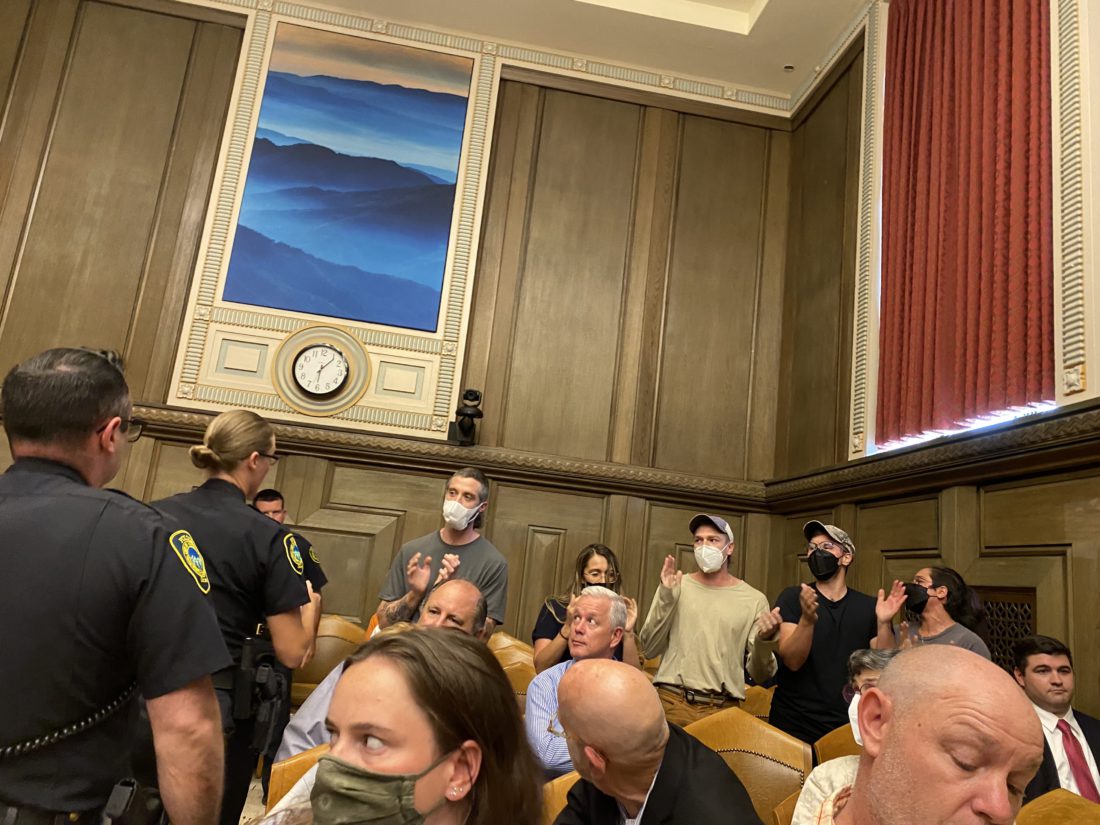During their June 28 meeting, Asheville City Council members voted 6-1 to approve the city’s fiscal year 2022-23 operating budget — but not without feedback.
“Defund APD! Cops don’t need more money!” shouted a group of five protesters, seconds after Council member Gwen Wisler moved to adopt the budget. The group was escorted out of City Hall by Asheville Police Department officers moments after interrupting the meeting. (A search of police records found no arrests tied to the protest, but a report filed for disorderly conduct at City Hall notes that the incident is under “further investigation.”)
Despite those objections, Council approved the $217.6 million budget, which includes over $30.1 million for the APD, an increase of about $1.65 million over estimated police spending in fiscal year 2021-22. Salaries and benefits are the APD’s largest spending driver at more than $24.1 million, even as the department expects about 40 of its 269 listed positions to remain vacant over the next fiscal year.
The budget also includes $500,000 for the city’s reparations fund, $108,000 to create an urban forester position and $300,000 to increase full-time employee salaries to a minimum of $36,816 per year. The city will allocate $2.5 million in federal American Rescue Plan Act funds to build a six-lane track for Memorial Stadium at the request of the historically Black East End/Valley Street neighborhood. Other new items include funding for a homeless strategy project specialist position at an estimated annual cost of $92,000 and $50,000 in recurring funds for Code Purple winter shelter.
Council member Kim Roney, the sole vote against the budget’s adoption, said she could not support it due to her concerns around the city’s public safety, the delayed implementation of the city’s new living wage and transit spending. The city’s Parking Services Fund typically earns enough revenue to provide about $1.6 million in support for city transit; however, the city missed out on roughly $800,000 in revenue due to faulty gate equipment at city garages, causing the amount transferred to transit to be cut to $1 million. The shortfall will continue to delay the implementation of the 2018 Transit Master Plan, a scheme for expanding the city’s bus system.
“I will not be supporting this budget tonight because I remain committed to affordability and to public safety, and I have concerns about how we’re doing the budget,” Roney said. “We are backing out of our commitment to expand transit funding. We do have to shore up our core service first, but we need to expand, not back out, with transit. Transit can’t wait.”
Meanwhile, Wisler, who was first elected to Council in 2013, noted that this budget vote would be her last, as she is not seeking reelection after her term expires later this year.
“Doing the budget is the hardest thing, and the most important thing, that Council members do, and this circle of women on this Council has probably spent more time and more energy and more passion around the budget adoption than I have ever seen,” she said. “You’ve all given it your all, and I just wanted to express my appreciation.”
City Hall updates 1920s paintings
Council’s return to City Hall for the first time in over two years also revealed that the city had covered murals located in Council Chambers that depict Indigenous people and white settlers. In response to the COVID-19 pandemic, Council had been meeting virtually or in the Banquet Hall at Harrah’s Cherokee Center – Asheville.
The paintings, by New York artist Clifford Addams, included one piece titled “White Man’s Family Council.” The work was once praised by art historians but has been criticized as containing racist stereotypes and imagery in recent years.
The panels containing the paintings are now covered with images of mountain landscapes. Mayor Esther Manheimer said that the change occurred during Council’s break from City Hall but did not explicitly say why the original paintings had been covered.
Several members of the public praised the change, including Southside resident and community advocate Roy Harris. “I think the last time I was in this room, I commented on the pictures that were on the wall. They’ve been changed — thank you,” said Harris, who is Black. “I feel more represented here now.”




The six lane track goes to show how stupid the city council is. Brand new field in one of the fastest growing sports in us and they are going to tear it up. All under the gise of racism. So the neighborhood wants it, maybe come as a form of reparations. Fire City Council. The city has not gotten better under current leadership especially Meinhammer.